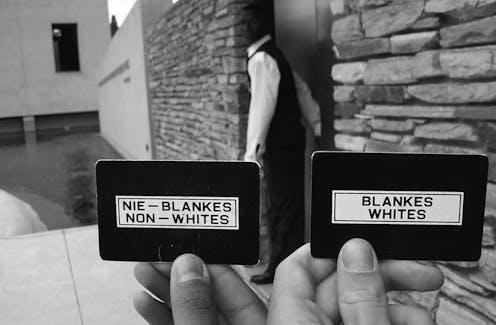The Voice isn't apartheid or a veto over parliament – this misinformation is undermining democratic debate
- Written by Dominic O'Sullivan, Adjunct Professor, Faculty of Health and Environmental Sciences, Auckland University of Technology, and Professor of Political Science, Charles Sturt University

Readers please be advised this article discusses racism.
We’ve heard many different arguments for and against the Voice to Parliament in the lead-up to this year’s referendum. This has included some media[1] and politicians[2] drawing comparisons between the Voice and South Africa’s apartheid regime[3].
Cory Bernardi, a Sky News commentator, argued[4], for instance, that by implementing the Voice, “we’re effectively announcing an apartheid-type state, where some citizens have more legal rights or more rights in general than others”.
As legal scholar Bede Harris has pointed out[5], it’s quite clear Bernardi doesn’t understand apartheid. He said,
How the Voice could be described as creating such a system is unfathomable.
Comparisons to apartheid
Apartheid was a system of racial segregation implemented by the South African government to control and restrict the lives of the non-white populations, and to stop them from voting.
During apartheid, non-white people could not freely visit the same beaches, live in the same neighbourhoods, attend the same schools or queue in the same lines as white people. My wife recalls her white parents being questioned by police after visiting the home of a Black colleague.
The proposed Voice will ensure First Nations peoples have their views heard by parliament. It won’t have the power to stop people swimming at the same beaches or living, studying or shopping together. It won’t stop interracial marriages as the apartheid regime did. It doesn’t give anybody extra political rights.
It simply provides First Nations people, who have previously had no say in developing the country’s system of government, with an opportunity to participate in a way that many say is meaningful and respectful.
Apartheid and the Voice are polar opposites. The Voice is a path towards democratic participation, while apartheid eliminated any opportunity for this.
Evoking emotional responses, like Bernardi attempted to do, can inspire people[6] to quickly align with a political cause that moderation and reason might not encourage. This means opinions may be formed from limited understanding[7] and misinformation.
Misinformation doesn’t stop at apartheid comparisons
The Institute of Public Affairs, a conservative lobby group, has published a “research” paper claiming the Voice would be like New Zealand’s Waitangi Tribunal and be able to veto decisions of the parliament.
The truth[8] is the tribunal is not a “Maori Voice to Parliament”. It can’t veto[9] parliament.
The Waitangi Tribunal is a permanent commission of inquiry. It is chaired by a judge and has Maori and non-Maori membership. Its job is to investigate alleged breaches of the Treaty of Waitangi.
The tribunal’s task is an independent search for truth. When it upholds a claim, its recommended remedies become the subject of political negotiation between government and claimants.
The Voice in Australia would make representations to parliament. This is also not a veto. A veto is to stop parliament making a law.
Read more: Australians should be wary of scare stories comparing the Voice with New Zealand’s Waitangi Tribunal[10]
We need to raise the quality of debate
Unlike the apartheid and Waitangi arguments, many objections[11] to the Voice are grounded in fact.
Making representations to parliament and the government is a standard and necessary democratic practice. There are already many ways of doing this, but in the judgement of the First Nations’ people who developed the Voice proposal, a constitutionally enshrined Voice would be a better way of making these representations.
Many people disagree with this judgement. The National Party[12] argues a Voice won’t actually improve people’s lives.
Independent Senator Lidia Thorpe says she speaks for a Black Sovereignty movement when she advocates for a treaty to come first[13]. The argument is that without a treaty, the system of government isn’t morally legitimate.
Read more: Sam Frost knows nothing about segregation: white settlers co-opting terms used to oppress[14]
Other people support the Voice in principle but think it will have too much[15] power; others[16] think it won’t have enough.
Thinking about honest differences of opinion helps us to understand and critique a proposal for what it is, rather than what it is not. Our vote then stands a better chance of reflecting what we really think.
Lies can mask people’s real reasons for holding a particular point of view. When people’s true reasons can’t be scrutinised and tested, it prevents an honest exchange of ideas. Collective wisdom can’t emerge, and the final decision doesn’t demonstrate each voter’s full reflection on other perspectives.
Altering the Constitution is very serious, and deliberately difficult to do. Whatever the referendum’s outcome, confidence in our collective judgement is more likely when truth and reason inform our debate.
In my recently published book, Indigeneity, Culture and the UN Sustainable Development Goals[17], I argue the Voice could contribute to a more just and democratic system of government through ensuring decision-making is informed by what First Nations’ people want and why. Informed, also, by deep knowledge of what works and why.
People may agree or disagree. But one thing is clear: deliberate misinformation doesn’t make a counter argument. It diminishes democracy.
References
- ^ media (www.youtube.com)
- ^ politicians (www.skynews.com.au)
- ^ South Africa’s apartheid regime (au.int)
- ^ argued (www.theguardian.com)
- ^ pointed out (news.csu.edu.au)
- ^ inspire people (www.pnas.org)
- ^ limited understanding (royalsocietypublishing.org)
- ^ truth (www.aap.com.au)
- ^ veto (www.abc.net.au)
- ^ Australians should be wary of scare stories comparing the Voice with New Zealand’s Waitangi Tribunal (theconversation.com)
- ^ objections (theconversation.com)
- ^ National Party (nationals.org.au)
- ^ come first (www.abc.net.au)
- ^ Sam Frost knows nothing about segregation: white settlers co-opting terms used to oppress (theconversation.com)
- ^ too much (independentaustralia.net)
- ^ others (theconversation.com)
- ^ Indigeneity, Culture and the UN Sustainable Development Goals (link.springer.com)

















